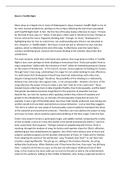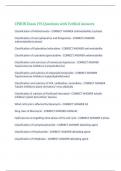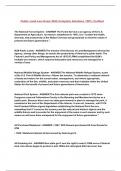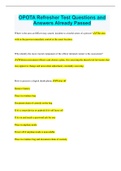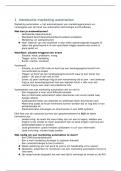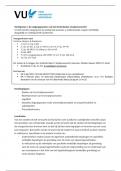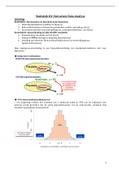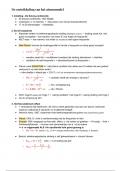Music plays an integral role in many of Shakespeare’s plays, however Twelfth Night is one of
his most musical productions, perhaps on the surface reflecting the merriment associated
with Twelfth Night itself. In fact, the first line of the play makes reference to music; “if music
be the food of love, play on.” Music in the play is often used in reference to love. Perhaps as
Orsino controls the music, flippantly deciding later “enough, no more,” Shakespeare is
highlighting how he tries to control love, not understanding why Olivia is not attracted to
him. However, in Twelfth Night, I feel music is used not just in reference to love, but also
sadness, which is reflected at the end of the play. Furthermore, even the name Illyria
conveys something lyrical, mystical and musical alluding to the comedic obscurities that
unfold there.
The main emotion, aside from merriment and sadness, that song tends to reflect in Twelfth
Night is love, even perhaps at times alluding to homosexual love. Orsino persuades Feste to
sing a song which “dallies with the innocence of love” whilst he intimately questions Cesario
on the nature of female love. In Tim Carrol’s version, Orsino explores his feelings for Cesario
through Feste’s love song, culminating in his anger for not understanding his own affections.
It is well known that Shakespeare himself may have had relationships with other men,
despite it being loosely illegal. Therefore, the possibility of him alluding to a relationship
between two characters who appear male, is not unreasonable. However, the lyrics of the
song reference the power of love to make a man feel “slain by a fair crawl maid.” These
instead may be referring more to idea of gender fluidity, than homosexuality, and the belief
that gender boundaries becomes insignificant in the presence of powerful true love.
Despite this, we must be cautious when applying modern day notions of sexuality and
gender to the Elizabethan era, as concepts of homosexuality simply did not exist. For
example, it was a sign of friendship when two close male friends embraced, even kissing one
another would not have been questioned as unusual behaviour. Just as Alan Bray suggests
‘The terms in which we now speak of homosexuality cannot readily be translated into those
of the sixteenth and seventeenth centuries.’ Therefore, we must address the power of song
and music to mock, which would be particularly befitting of the their singer; Feste the fool.
Feste’s love song for Orsino is particularly tragic, and slightly morbid, comparing the cruelty
of love to death; a story of a man who wishes to be buried anonymously where a “sad true
lover could never find my grave.” Perhaps instead of sympathising with Orsino, Feste is
mocking, through the medium of song, his forlorn and hopeless chase for Olivia’s affection,
addressing just how melodramatic he appears. One of the more obvious uses of music and
song for comedic purposes are the drunken interactions of Feste, Sir Tobey and Sir Andrew.
Feste adapting the words of the well known song “farewell, dear heart” to suit their own
situation, angering Malvolio. The pair go on, adding to the drunken disorder, by acting
deliberately facetiously. When Malvolio asks if they know the time, they reply “we did keep
time,” using the word time as a pun, as the pair are referring to rhythmical time of their
song. In this instance the music adds just as much to the plot as well as the entertainment
value for the audience, adding to their dislike of Malvolio, who, being a supposed puritan is

